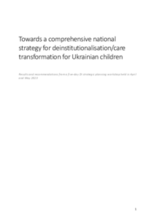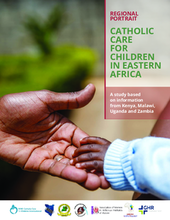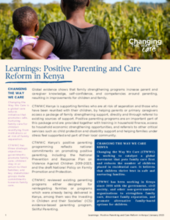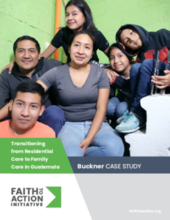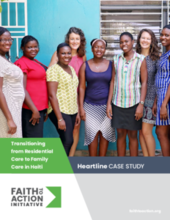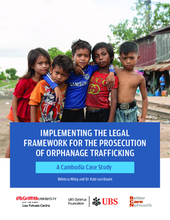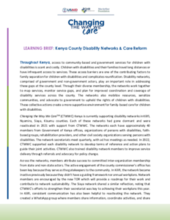Displaying 31 - 40 of 691
During April and May 2023, the Ukrainian Ministry of Social Policy joined forces with a broad range of civil society actors to facilitate five days of learning and intensive strategic planning on deinstitutionalization. This document presents the key findings and recommendations from those five days of exchange of ideas and strategic planning. It is hoped that these recommendations will inform the government’s strategic planning process, as well as providing insight for donors to inform their priorities.
This regional portrait describes Catholic-sponsored care for children in Eastern Africa using data from Kenya, Malawi, Uganda and Zambia. The first large study of its kind, it focuses on children who are particularly vulnerable—those at risk of or those who have been separated from their families. Many are in institutional care. This portrait also describes growing efforts, led by women and men religious, to ensure children can grow up in safe, nurturing families or family-like environments rather than institutions.
Positive parenting programs are an important part of this package and are provided together with training in household finance, access to household economic strengthening opportunities, and referrals to other critical services such as child protection and disability support and helping families under stress feel supported and part of their local community. This brief describes the program and interventions.
National Network for Children (NNC) released its monitoring Report Card 2023 which evaluates the progress of Bulgarian state care institutions in eight areas – Child participation, Child Welfare, Family Environment and Alternative care, Protection from all forms of Violence, Child Justice, Early Childhood Development, Child Health, Education, Sport, Culture and Leisure.
The story of Buckner Guatemala’s transition from residential care to family care is told in this recently released Faith to Action case study. The case study details their experience through three stages of transition—learning, preparation and planning, and full transition—with transparency. It addresses common challenges for transitioning organizations, as well as the strategies Buckner took to overcome them.
The story of Heartline’s transition from residential care to family care is told in this recently released Faith to Action case study. The case study details their experience through three stages of transition—learning, preparation and planning, and full transition—with transparency. It addresses common challenges for transitioning organizations, as well as the strategies Heartline took to overcome them.
This webinar looked at ways to raise awareness among the general public on the right to independent living and the harm of institutionalisation for the entire society.
This study was conducted as a part of a multi-stage, multi-country project designed to enhance the identification, prosecution, and prevention of orphanage trafficking crimes. It was the second of four stages to be conducted in Cambodia as one of three jurisdictions included in the study.
This webinar was hosted by the Evidence for Impact Working Group of the Transforming Children’s Care Collaborative on March 30, 2023, and examined the Early Institutionalization Intervention Impact Project in Brazil.
This learning brief shares learning from Kenya around the barriers that contribute to family separation for children with disabilities and how disability networks are working to create a supportive environment for family-based care for these children.

